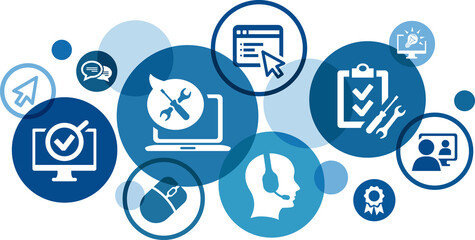The importance of the right channel
When thinking of customer service, people often imagine a huge call centre filled with people on the phone. However, as important as the phone call may be, it's not the only channel out there. Preferred channels often differ during different parts of the customer journey. For example, when a customer has questions about your product, they might use the chatbot on your website to pick up the phone. But don’t be fooled into thinking that the phone is solely a channel for escalations. During the podcast, Marije indicated that it could be both. Many channels nowadays are digital, but if you're 75 years old and don’t understand how to use a laptop, you won’t go for an online solution. Instead, you will pick up the phone and call - even for issues that don’t need escalating. However, during this technological revolution, the phone is becoming more and more obsolete.
The evolution of CS
For instance, social media has become a big new player in the customer experience. Think of interaction underneath Instagram posts and reviews on Google and other platforms - all are a very important part of customer service and should not solely be used as a marketing tool. Take Twitter, for example; it’s a very frequently used channel to contact an organisation, with the distance between customer and business disappearing due to quick response times and instant connections. It shows how you can have the best of both worlds - sales, marketing, and customer service intertwined. Marije also delves into chatbots, stating that she has mixed feelings about them. “If it's purely informative, it's a great tool. However, my personal experience is that you often don’t get the right answer to more complex questions. In my experience, I always prefer to talk to a real person. The way I see chatbots is more like a luxury FAQ, great for getting to know stuff like what the shipping costs are or how to return an item.” So don’t automate everything just yet. Tech can solve so much, but empathy is the golden ticket to a true connection. Human to human.
Appreciate your customer service agents
When asked about that human connection, Marije elaborates that she believes that people who work in customer service are at the core and heart of the company. They are the only ones in constant contact with the customer, which means they know the nitty-gritty details. They know if a parcel service just isn’t working out, what channels customers enjoy, how specific issues within the supply chain can be resolved, and how customers want to be treated overall. All information that other parts of the organisation just don’t know about.
That’s exactly why it’s so important to appreciate your CS agents. They hold the key to unparalleled insights, but they are also the people who are safeguarding your brand every day. Marije finds it such a shame that customer service seems to have quite a negative image. It isn’t just call centres and scripts; it’s challenging and important work that requires intelligence and empathy, both very visible at the weWow office in Valencia. “Our agents are highly educated, passionate about helping people and truly part of the weWow family. They are golden.” She underlines the importance of treating your agents well: “We think it’s incredibly important to see a person as an actual human being instead of just a number. We know our agents' names, where they come from, their stories…It can be daunting to move to another country, and it can be scary. That’s why we make sure that at weWow, we have a family vibe. We provide lunches, drinks, Spanish lessons to help them integrate, and most of all; we’re compassionate.”
The core of getting the best out of your customer service agents? Talk to them. Ask them what makes them happy and give them the tools to go out and do it.
From cost to profit centre
Marije's core belief is that customer service is a profit centre, not a cost centre. If you set it up properly, it can boost brand value by providing customers with positive interactions which they will relay to their friends and family. You might need to make it a bit smaller to put it into scope. For example, what is the best restaurant in Breda? When asked, people will tell you about that one restaurant with good food and amazing service. It works the same way for bigger companies - word of mouth is powerful and can be influenced by great customer service. “It’s a strange phenomenon; companies solely see customer service as a cost centre. They spend so much money on acquisition, but they backtrack on investments once they have gained a customer. Why don’t they try to hold on to the people they already have? Customer service needs to be more central in the company strategy, not just an afterthought.”
Customer service at the heart of your business
But how do you go from afterthought to the main player within the company? Organisations that have great customer service often implement it throughout the entire business. Customer service is seen as an overarching component that touches all bases instead of something that happens after the customer has bought a product. Giving customer service this birdseye view makes it easier to improve service and identify errors in the customer journey. So instead of setting budgets for individual departments such as marketing, customer service, or finance, you should budget for the entire journey. How much do we need to keep the customer happy throughout their whole time with us?
The next step is creating a clear line of communication from customer service back to the other departments. Ensure that agents' feedback is relayed or escalated to the correct department. WeWow lives by this and makes sure that all feedback is brought to the attention of their clients. No complaint should be left untouched.
To sum it all up:
Step 1: Know your customer. Do you have one segment or a lot more? And have you given them the preferred channels of contact? Reach out to agents and ask them what they would advise.
Step 2: Make customer service a company-wide department instead of leaving it till the end of the customer journey.
Step 3: Treat your agents right. Happy people equal happy customers.
Step 4: Believe in your power as an organisation. If you live by your vision, it’ll all fall into place.
Listen to the podcast.
Interested in learning more? Check out our blog on customer service channels here.






